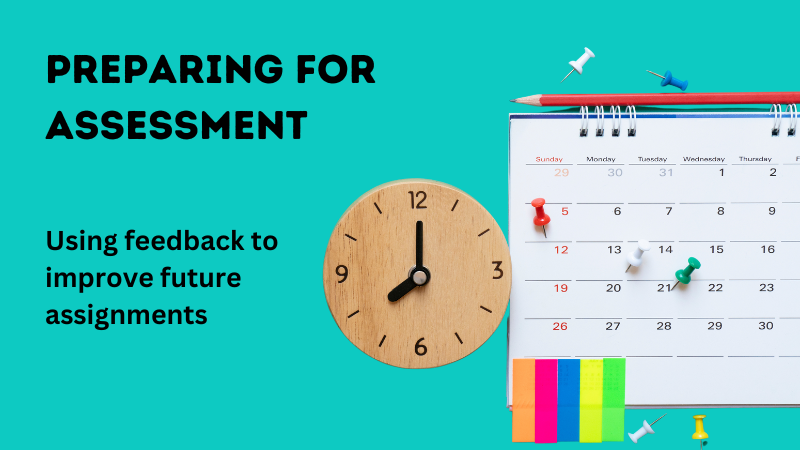No-one is born knowing how to produce perfect academic writing. However, we can all improve, and the main way we do this is through responding to feedback.
Feedback is information about what you did well and what you still need to improve on.
It can be written or spoken and come from fellow students, yourself, or a tutor.
Understanding feedback
It’s important to understand feedback before you can act on it and understanding grading criteria really helps with this.
Grading criteria contain descriptions of good (and not so good) work according to a range of categories and tutors use these to decide what was strong in your work and what needs improvement.
Here are some common areas found in grading criteria. It’s important to be familiar with these. (Don't forget, you can book a 1:1 tutorial with us via MySkills if you're unsure and would like to go through this with a tutor in more detail.)
Language accuracy
How much your writing conforms to grammatical rules and the appropriate use of vocabulary.
Coherence
How clear the writing is because the ideas are in an order useful to a reader.
Cohesion
How clear you make the connections between ideas, for example by using linking words like however.
Critical thinking
Your ability to judge how well experts’ claims are supported by evidence and to provide strong evidence for your own claims.
Use of sources
How well you have used information from sources either to help explain ideas or to help support your arguments, whilst ensuring you cite and paraphrase correctly to avoid the risk of plagiarism.
Mechanics
Accuracy of spelling, punctuation, formatting and so on.
If feedback is unclear:
- Check with the person who gave the feedback.
- Ask a fellow student.
- Check against online resources.
- Book a writing tutorial with the Skills Centre through MySkills.
How you feel about feedback
No matter how useful a bit of feedback is, it’s no use at all if you can’t face hearing it… but remember that even the best writers can improve: no one is above getting feedback!
Being critical about feedback
It can be a useful exercise to question the feedback you get. For example, if you get advice from another student, you may think it sounds wrong. If so, then check.
If they turn out to be right, you get a useful correction; if they’re wrong, at least you know what’s what for sure now.
Just make sure you’re not being overly defensive to save your feelings!
Recording feedback
Most, if not all, of the feedback you get will be written but if feedback is spoken only, make a note of it.
Look for patterns of error in the feedback. Has a particular type of error been pointed out more than once? If so, then this is something you should consider working on as a priority, especially if it occurs across more than one piece.
We are now talking about improving you as a writer (as opposed to just improving individual pieces of writing).
You may find it useful to make a note of such patterns in one of the following ways:
- An e-portfolio site such as Mahara.
- A physical folder or notebook.
- A digital notebook e.g. Microsoft OneNote.
- A folder on your computer.
To sum up:
- Understand what feedback in general is about (for example, coherence).
- Check if you don’t understand any comments.
- Remember that feedback benefits you, so don’t be disheartened!
- Question feedback.
- Record feedback and look for patterns.
Respond



